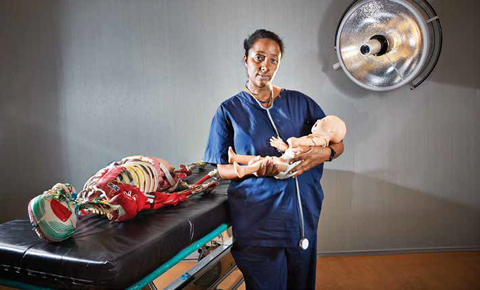When Dr. Tihitena Negussie Mammo returns to Addis Ababa this fall, the number of pediatric surgeons in Ethiopia will go up by 20 per cent. The young doctor, who just completed a six-month A.K. Prakash Fellowship in International Medicine at U of T, hopes to pass on what she’s learned.
“My goal is to increase the number of pediatric surgeons in Ethiopia,” she says simply. “Having only six for the whole country is not enough.”
At Addis Ababa University, where Tihitena is a professor, there are only nine operating theatres. One is for pediatrics. “It is not enough to treat all patients,” she explains, “as much as we want to. So usually what we will do is one team will be in the OR, another team will do rounds, another will staff the referral clinic, another will teach. Each day we have a different division of labour, so we can both teach and do surgery.”
At U of T, Tihitena trained in laparoscopy, a technique that uses thin tubes and video cameras to help surgeons do their work – for example, repairing a hole in a baby’s intestine – through a tiny incision. It’s less traumatic for patients, who heal faster with less scarring. Back home, however, Tihitena will have to turn lobbyist before she can practise the technique. “Lack of facilities is the most important problem that we face,” she says. “I’m trying to ask the government to buy some equipment, so that we can be doing this surgery like any other modern hospital.”
The A.K. Prakash Foundation has donated $300,000 to date, to fund one or two fellowships annually for a surgeon from a low- or middle-income country. Since the program started in 2013, it has shared Canadian expertise with doctors from Zimbabwe, Nigeria and Ethiopia.
“I learned a lot,” says Tihitena. “I saw different surgical methods, postoperative management techniques that can change outcomes, and how experts in different specialities can affect patient outcomes. All this will help me teach – I got a lot of experience.”
| MEET THE DONOR A.K. Prakash Foundation Ash Prakash wears many hats – he’s an art collector and arts patron who enjoyed a stellar career in the Canadian civil service. So it’s not surprising that he conceived of a dual mission for his giving. As well as funding an international surgery fellowship at U of T, the A.K. Prakash Foundation supports arts and culture causes through activities such as sponsoring exhibitions of Canadian art. It’s important to nurture complementary sides to human development, Prakash explains. “It is my belief that essentially, there are two governing forces that identify us as human beings. One is our physical well-being, the state of our health. And the other is the mind, the spirit, that governs our body – our understanding of who we are, why we are here, where we are going. I believe these two forces really provide some meaning to our existence on this earth.” The A.K. Prakash Fellowship in International Medicine embraces the health side of this mission. “I wished to support the world-class expertise that Canada has in its medical institutions, such as U of T’s medical faculty,” says Prakash. “My idea is that doctors, already trained in their own countries, can come to train with our doctors. The faculty chooses the countries based on maximum need. And after their training, the doctors go back. Instead of robbing countries of their best-trained doctors, the work continues, and one and one becomes 11.” |
Read all four stories in this series about gifts to the Boundless campaign and the powerful impact they are having:
> Turning subject-matter experts into journalists
> Ethiopia’s sixth pediatric surgeon will share what she’s learned
> Ensuring educational choice for undergraduate students
> The classroom of the future will help engineers get hands-on
Recent Posts
People Worry That AI Will Replace Workers. But It Could Make Some More Productive
These scholars say artificial intelligence could help reduce income inequality
A Sentinel for Global Health
AI is promising a better – and faster – way to monitor the world for emerging medical threats
The Age of Deception
AI is generating a disinformation arms race. The window to stop it may be closing




